In today's data-driven world, an Informatica Developer plays a crucial role in managing and transforming data to fuel business insights. However, many companies struggle to find candidates with the right blend of technical expertise and problem-solving skills. Often, recruiters overlook the specific qualifications and hands-on experience required for this role, resulting in mismatched hires that can impact the efficiency of data processes.
This blog post is designed to guide you through the intricacies of hiring an Informatica Developer. From understanding the role and crafting effective job descriptions to navigating the hiring process and conducting technical interviews, we cover all aspects. Check out our Informatica Developer Interview Questions for a deeper understanding of what to expect during interviews.
Table of contents
Why Hire an Informatica Developer?
An Informatica Developer can solve complex data integration challenges for your organization. They specialize in extracting, transforming, and loading data from various sources into your data warehouses or analytics platforms.
Consider hiring an Informatica Developer when you need to:
- Streamline your ETL processes
- Improve data quality and consistency
- Enhance reporting and analytics capabilities
Before committing to a full-time hire, assess your ongoing data integration needs. For short-term projects or to evaluate the role's impact, consider working with a consultant or service provider. Once you've identified long-term value, bringing on a dedicated Informatica Developer can significantly boost your data management capabilities.
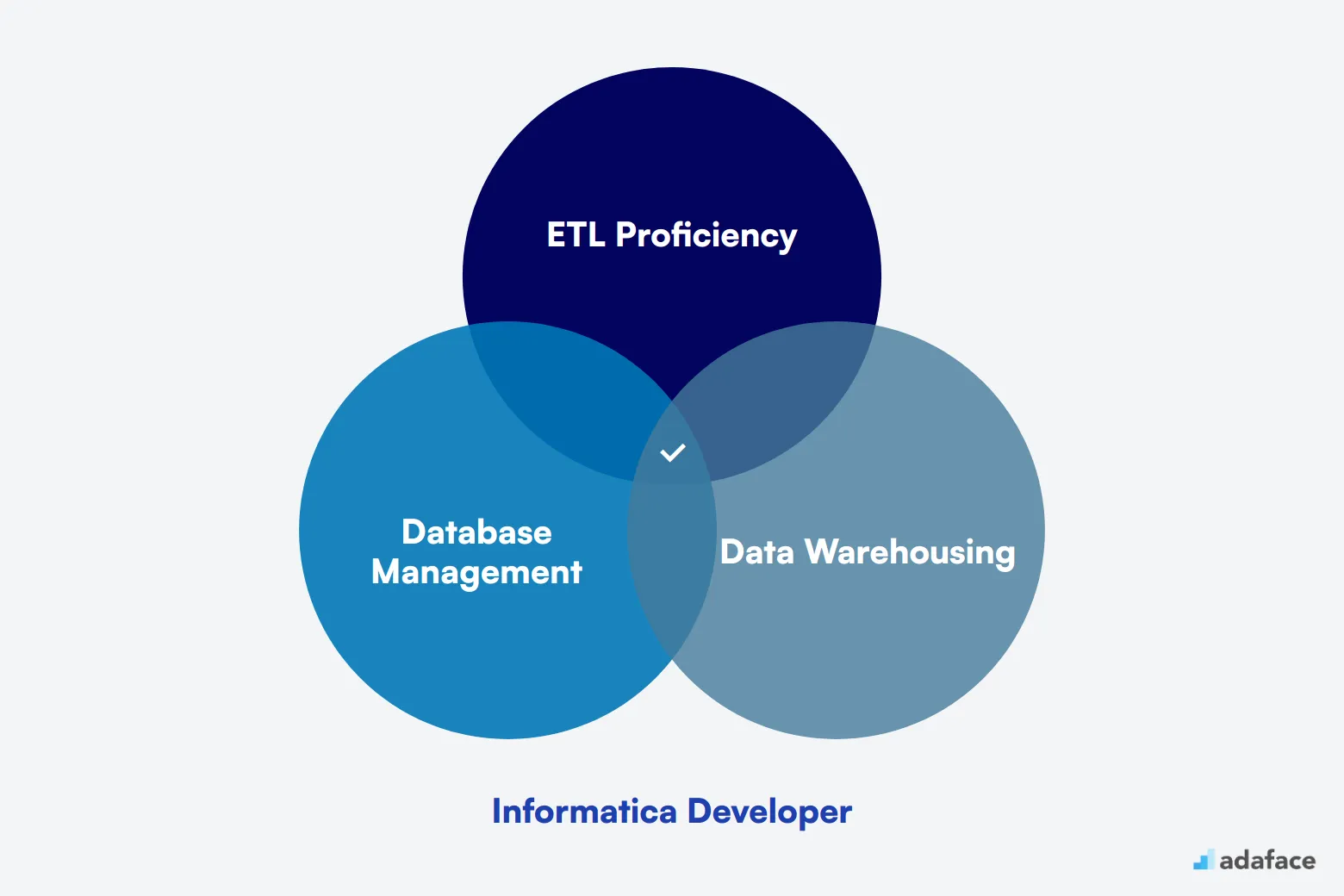
What does an Informatica Developer do?
An Informatica Developer specializes in using the Informatica platform to design, develop, and manage data integration solutions. This role is essential in helping organizations harness their data to make informed decisions and optimize business processes.
Day-to-day tasks for Informatica Developers include:
- Designing and developing data integration mappings and workflows using Informatica tools.
- Collaborating with data architects and business analysts to understand data requirements and ensure alignment with business objectives.
- Performing data quality checks and troubleshooting issues to ensure data accuracy and consistency.
- Maintaining and optimizing existing data integration solutions to improve performance and scalability.
- Documenting processes and providing technical support for data integration solutions. For more information on the skills required for this role, you can refer to skills required for Informatica developer.
Informatica Developer Hiring Process
Hiring an Informatica Developer requires a well-defined process to ensure the best fit for your organization. This guide outlines a straightforward approach to streamline your recruitment efforts.
- Craft a compelling job description: Start by detailing the Informatica Developer's responsibilities and required skills. This will serve as a filter for suitable candidates. You can refer to a sample job description to get started.
- Post the job description online: Use popular job boards and industry-specific sites to broaden your reach. Expect applications to begin pouring in shortly.
- Resume screening: Analyze resumes for key skills and qualifications. This step generally takes a week.
- Conduct skills assessments: Leverage skills assessments or coding tests to evaluate candidates' technical expertise. This step can take an additional week.
- Interview process: Shortlisted candidates should be moved to the interview stage, where you can assess their problem-solving abilities and cultural fit.
- Finalize the offer: Choose the most suitable candidate and extend the job offer.
Overall, the process can take between 4 to 6 weeks, depending on how swiftly each step is executed. Be prepared for a structured approach to ensure you find the best candidate. In the following sections, we will explore each step in detail, providing valuable checklists and resources to aid your hiring process.
Key Skills and Qualifications for Hiring an Informatica Developer
When hiring an Informatica Developer, it’s important to create a precise candidate profile that matches your team's needs. A common pitfall is overemphasizing certain skills while undervaluing others that may be equally important. Remember, some qualifications are 'must-haves,' while others might simply be 'nice-to-haves.'
To clarify, here’s a breakdown of essential skills and preferred qualifications for an Informatica Developer:
- Required Skills:
- Bachelor's degree in Computer Science, Information Technology, or related field
- 3+ years of experience with Informatica PowerCenter or similar ETL tools
- Proficiency in SQL and database management systems
- Understanding of data warehousing concepts
- Strong problem-solving and analytical skills
- Preferred Skills:
- Experience with cloud platforms like AWS or Azure
- Knowledge of other ETL tools and practices
- Understanding of data governance and data quality processes
- Experience with Agile development methodologies
- Strong communication and teamwork skills
For a deeper understanding of how to assess these skills, consider exploring our skills assessment tools that can help streamline your hiring process.
| Required skills and qualifications | Preferred skills and qualifications |
|---|---|
| Bachelor's degree in Computer Science, Information Technology, or related field | Experience with cloud platforms like AWS or Azure |
| 3+ years of experience with Informatica PowerCenter or similar ETL tools | Knowledge of other ETL tools and practices |
| Proficiency in SQL and database management systems | Understanding of data governance and data quality processes |
| Understanding of data warehousing concepts | Experience with Agile development methodologies |
| Strong problem-solving and analytical skills | Strong communication and teamwork skills |
How to Write an Effective Informatica Developer Job Description
Once you've identified the key skills and qualifications for your Informatica Developer role, it's time to craft a compelling job description. A well-written job description can attract top talent and set clear expectations for candidates.
Here are some tips to create an impactful Informatica Developer job description:
- Highlight specific technical skills: Clearly outline required expertise in Informatica PowerCenter, ETL processes, and SQL.
- Balance technical requirements with soft skills: Emphasize problem-solving abilities, teamwork, and communication skills.
- Showcase project complexity: Describe the types of data integration projects they'll work on to attract experienced developers.
- Include growth opportunities: Mention possibilities for skill development and career advancement within your organization.
Top Platforms to Hire Informatica Developers
Now that you have a detailed job description for the Informatica Developer role, it's time to source candidates by listing the position on various job platforms. Choosing the right sites can significantly impact your reach and the quality of candidates you attract.
Dice
Ideal for finding specialized Informatica Developer roles across various industries. Offers advanced search filters for specific skills and certifications.

LinkedIn Jobs
Excellent for leveraging professional networks and finding both advertised positions and hidden job opportunities through connections.

Indeed
Aggregates listings from multiple sources, providing a wide range of Informatica Developer positions from various companies and locations.

Consider starting with popular platforms like Dice for tech-focused searches, or LinkedIn Jobs to leverage professional networks. General job boards such as Indeed can also provide a broad spectrum of candidates across different industries. For the remaining platforms, you can explore options like Glassdoor, Monster, Toptal, Upwork, Stack Overflow Jobs, Robert Half Technology, and CyberCoders, which each offer unique advantages depending on your specific hiring needs.
Keywords to Look for in Informatica Developer Resume
Resume screening is a handy first step in the hiring process, enabling you to quickly sift through numerous applications for an Informatica Developer role. This process helps you focus on candidates who meet the basic criteria and are worth further evaluation.
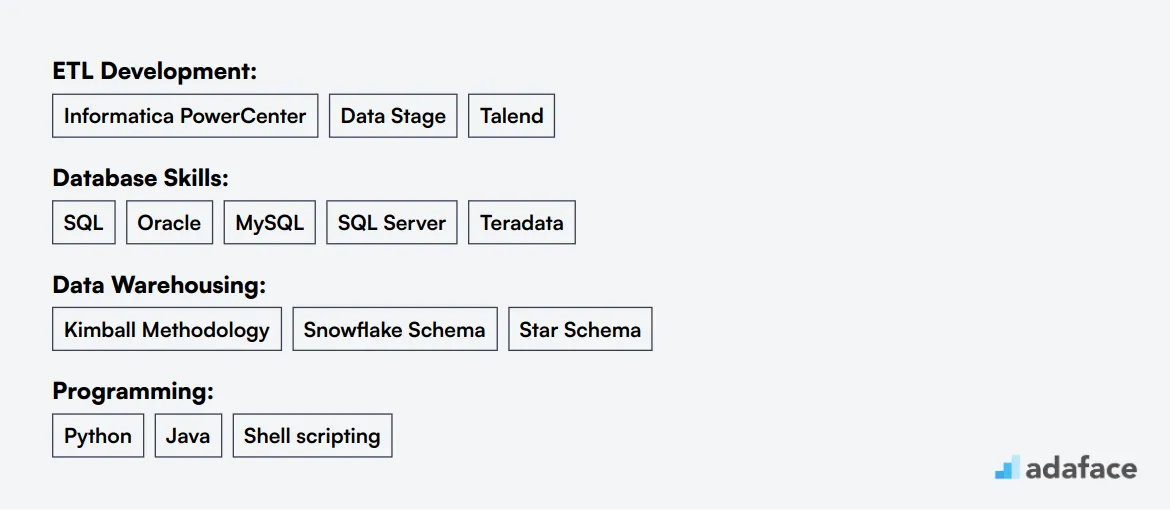
To manually screen resumes, identify primary and secondary keywords that are relevant to the Informatica Developer role. Look out for skills like ETL tools proficiency, database management, and data warehousing concepts. By focusing on these keywords, you can shortlist candidates who align with your hiring needs and move efficiently to the interview stage.
Incorporating AI large language models (LLMs) can streamline your resume screening process. Tools like Claude or Chat GPT can analyze resumes against a set of predefined keywords, saving time and ensuring consistency. By leveraging AI, you can enhance your hiring strategy and focus on promising candidates.
Here's an example prompt you can use with AI tools:
TASK: Screen resumes to match job description for Informatica Developer role
INPUT: Resumes
OUTPUT: For each resume, provide following information:
- Email id
- Name
- Matching keywords
- Score (out of 10 based on keywords matched)
- Recommendation (detailed recommendation of whether to shortlist this candidate or not)
- Shortlist (Yes, No or Maybe)
RULES:
- If you are unsure about a candidate's fit, put the candidate as Maybe instead of No
- Keep recommendation crisp and to the point.
KEYWORDS DATA:
- ETL Tools (Informatica PowerCenter, Data Stage, Talend)
- Database Skills (SQL, Oracle, MySQL)
- Data Warehousing Concepts (Kimball Methodology, Snowflake Schema)
For more insights on this, you can explore skills required for Informatica Developer and check out our job descriptions for Informatica Developer to ensure you're on the right track.
Recommended Skills Tests to Screen Informatica Developers
Informatica Developers play a core role in managing data integration tools and processes. To assess their proficiency, skills tests provide an objective measure of a candidate’s abilities. Here are some recommended tests:
Informatica Online Test: This test evaluates the candidate's knowledge in Informatica, covering topics such as data integration, ETL processes, and Informatica PowerCenter. It's ideal for understanding their capability in handling real-world data scenarios.
Informatica Data Quality Test: Use the Informatica Data Quality Test to assess how candidates approach data quality management and their ability to implement data quality transformation rules.
ETL Online Test: An ETL Online Test measures skills in extracting, transforming, and loading data. This is crucial for Informatica Developers who must ensure seamless data flow across systems.
Data Modeling Test: The Data Modeling Test evaluates a candidate's understanding of data structure and schema design, which are key for developing efficient ETL pipelines.
SQL Online Test: Informatica Developers frequently use SQL for querying databases. The SQL Online Test helps assess their ability to write and optimize SQL queries.
Case Study Assignments to Evaluate Informatica Developer Skills
Case study assignments can be valuable for assessing Informatica Developer skills, but they come with drawbacks. They're often time-consuming, leading to lower candidate participation rates and potentially losing qualified applicants. However, when used strategically, they can provide deep insights into a candidate's abilities.
ETL Process Optimization: This case study tasks candidates with optimizing an existing ETL process. They're given a scenario with current performance issues and asked to propose improvements using Informatica PowerCenter. This assignment tests their problem-solving skills and Informatica PowerCenter expertise.
Data Warehouse Design: Candidates are presented with a business scenario requiring a new data warehouse. They must design the schema, create sample mappings, and explain their rationale. This case study evaluates their data modeling skills and understanding of data warehouse concepts.
Real-time Data Integration: This assignment focuses on implementing a real-time data integration solution. Candidates are asked to design a system that combines batch and real-time data processing using Informatica tools. It tests their knowledge of advanced Informatica features and ability to handle complex data integration scenarios.
Structuring Technical Interviews for Informatica Developers
After candidates pass the initial skills tests, it's time for technical interviews to assess their hard skills in depth. While skills tests are great for initial screening, technical interviews help identify the best-fit candidates for the Informatica Developer role. Let's look at some sample interview questions to evaluate candidates effectively.
Consider asking these questions: 1) 'Can you explain the difference between active and passive transformations in Informatica?' 2) 'How do you handle slowly changing dimensions in data warehousing?' 3) 'What's your approach to optimizing Informatica workflows?' 4) 'Describe a complex ETL process you've implemented.' 5) 'How do you ensure data quality in Informatica pipelines?' These questions help assess the candidate's Informatica Developer skills and real-world experience with ETL processes and data warehousing concepts.
How much does it cost to hire an Informatica Developer?
Hiring an Informatica Developer can vary widely in cost depending on location and experience. In the United States, salaries typically range from $78,000 to $133,000 annually, with a median of around $102,000. For those recruiting in Australia, expect average salaries to hover around AUD 120,000 per year, with entry-level positions starting at AUD 97,000 and seasoned experts earning up to AUD 145,000.
Informatica Developer Salary in the United States
The average salary for Informatica Developers in the United States ranges from $78,000 to $133,000 per year. The median salary is around $102,000, with variations based on factors like location, experience, and company size.
Top-paying cities for Informatica Developers include Dallas, Austin, and San Francisco, with median salaries exceeding $114,000. New York and Atlanta also offer competitive compensation, with median salaries above $102,000.
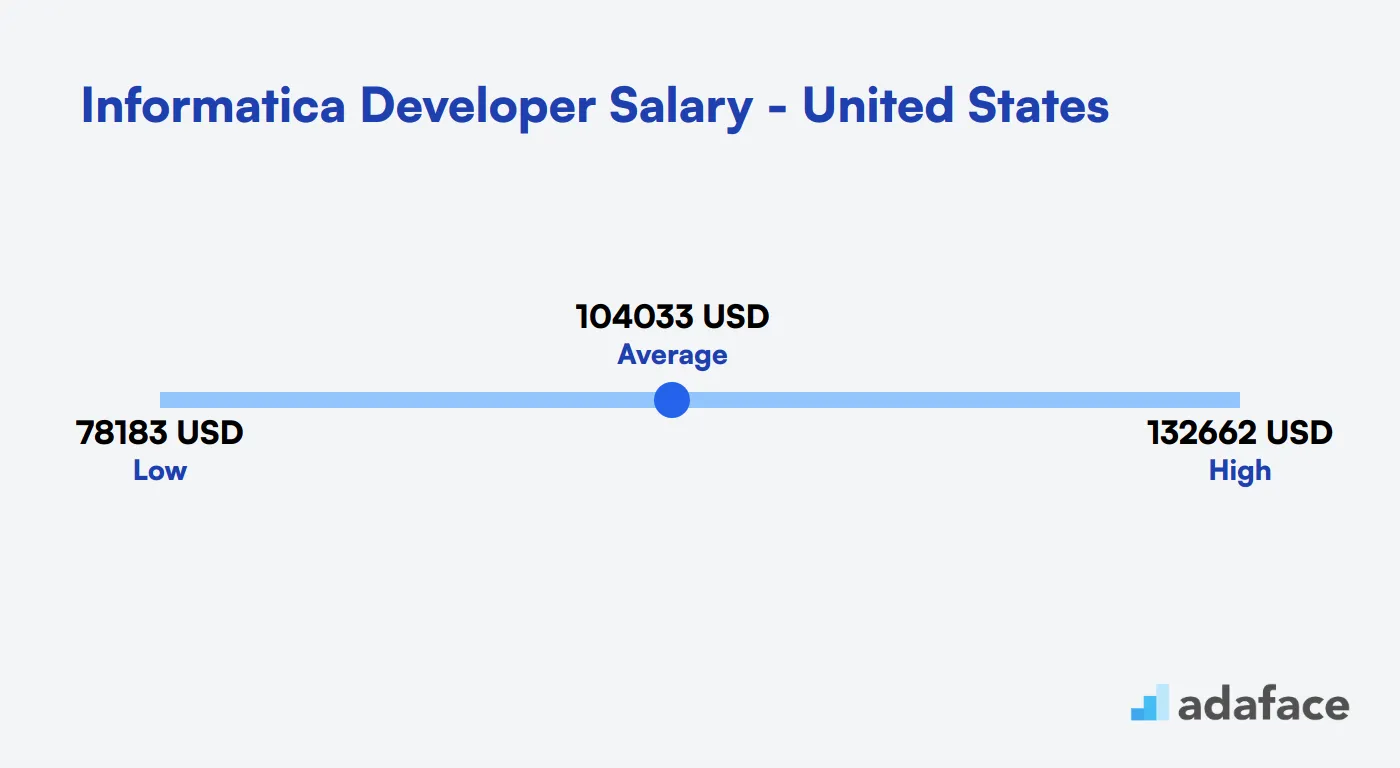
Informatica Developer Salary United Kingdom
In the United Kingdom, Informatica Developers earn an average salary ranging from £40,000 to £85,000 annually, with a median salary around £60,000. Factors influencing this range include experience level, location, and the complexity of projects they undertake. Those with specialized skills in data integration and management may command salaries at the higher end of the spectrum.
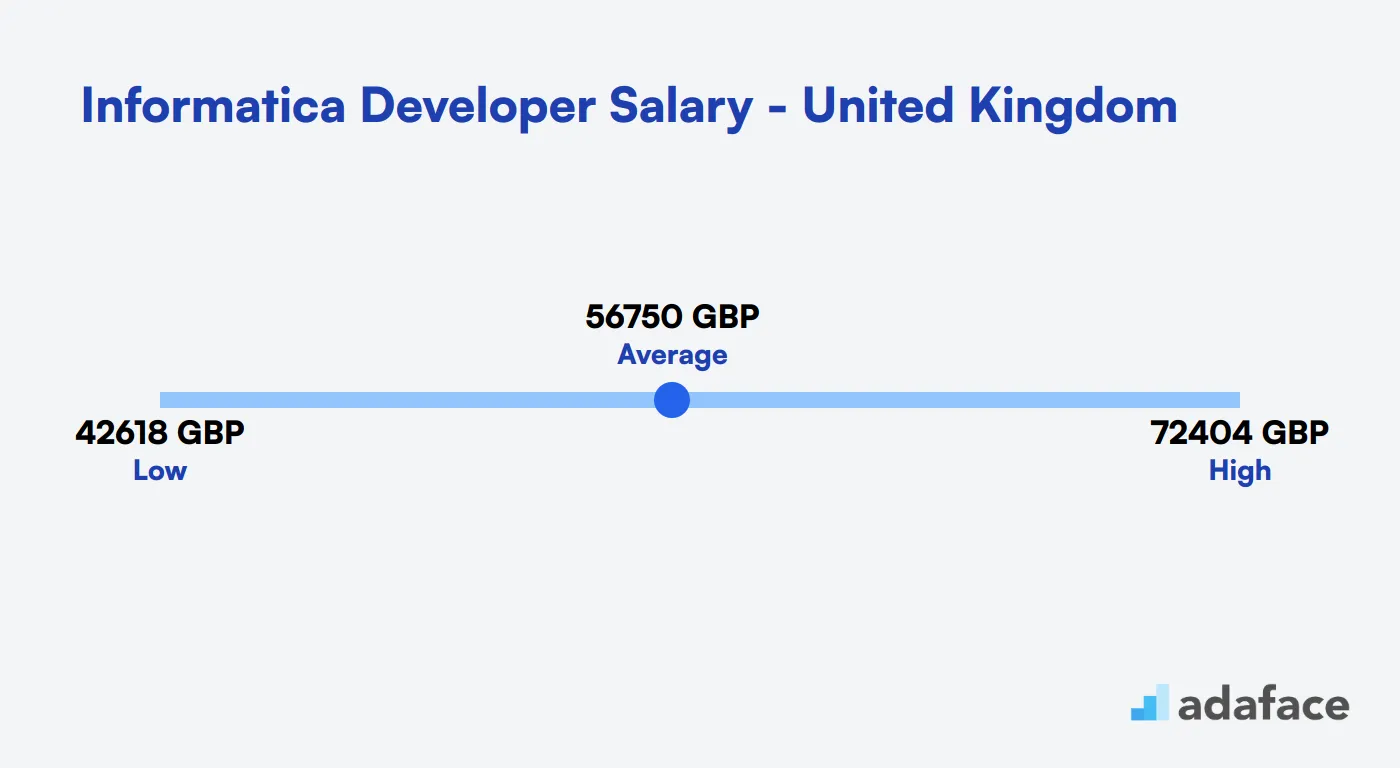
Informatica Developer Salary in Australia
In Australia, Informatica Developers can expect competitive salaries. The average salary for this role is around AUD 120,000 per year. Entry-level positions start at about AUD 97,000, while experienced professionals can earn up to AUD 145,000 annually.
Salaries may vary based on location, with Sydney offering a median of AUD 95,000. Keep in mind that these figures can fluctuate depending on factors such as experience, skills, and company size.
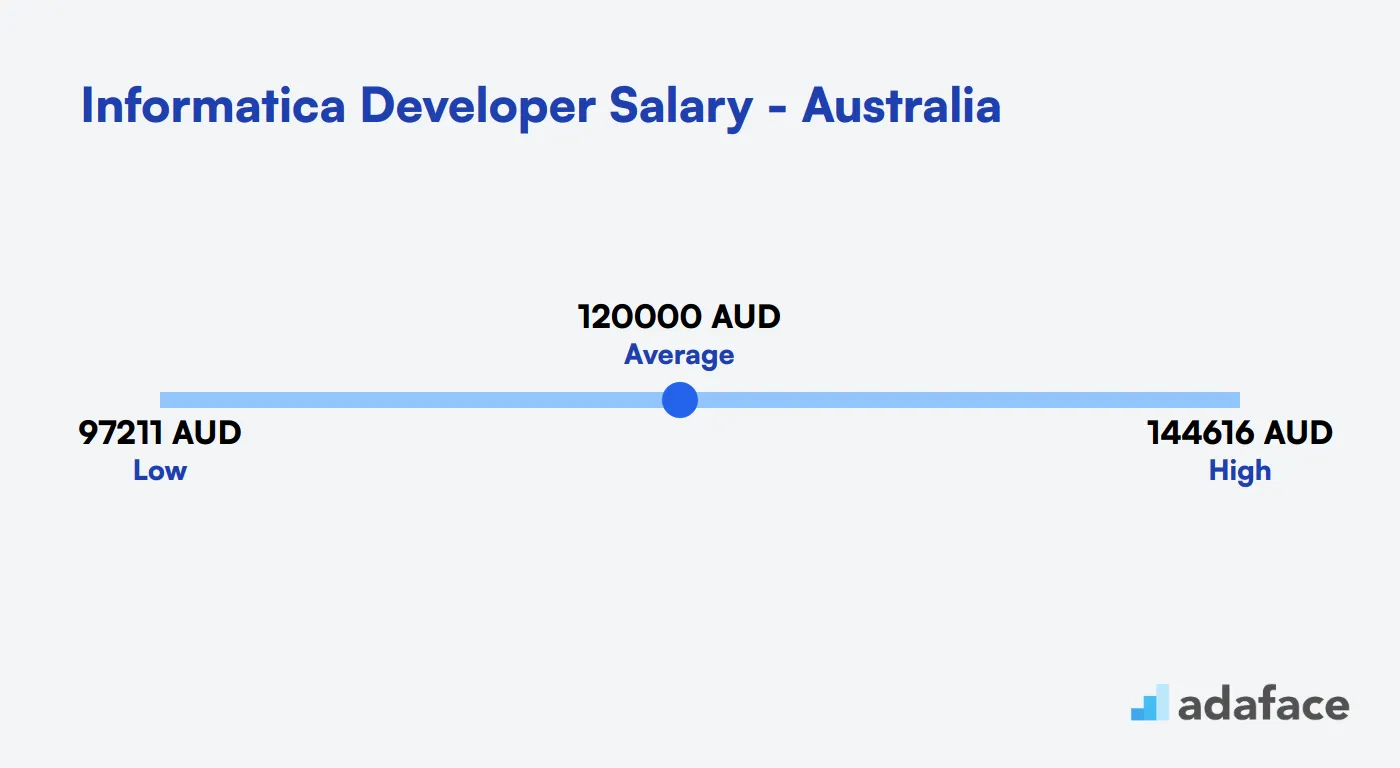
What's the difference between an Informatica Developer and an Informatica ETL Architect?
Informatica Developers and ETL Architects often work closely in data integration projects, which can blur the lines between their roles. However, these positions have distinct responsibilities and skill sets that set them apart in the data management landscape.
An Informatica Developer typically has 2-5 years of experience and focuses on building ETL solutions using Informatica PowerCenter and SQL. They work on specific projects, collaborating with data analysts to implement data transformations and troubleshoot issues.
In contrast, an Informatica ETL Architect brings 5-10 years of experience to the table. They design the overall ETL architecture, oversee multiple projects, and work closely with stakeholders and developers. Their expertise extends to data modeling, and they're often expected to have a master's degree.
The key differences lie in their level of decision-making and problem-solving approaches. Developers handle day-to-day coding and issue resolution, while architects make high-level decisions and provide architectural solutions for complex data challenges.
When hiring for these roles, it's crucial to assess candidates' technical skills and problem-solving abilities to ensure they fit the specific requirements of each position.
| Informatica Developer | Informatica ETL Architect | |
|---|---|---|
| Experience Level | 2-5 years | 5-10 years |
| Core Responsibilities | Develop ETL solutions | Design ETL architecture |
| Technical Skills | Informatica PowerCenter, SQL | Informatica PowerCenter, Data Modeling |
| Project Involvement | Single project focus | Multiple projects oversight |
| Collaboration | Work with data analysts | Work with stakeholders, developers |
| Problem-Solving | Issue troubleshooting | Architectural solutions |
| Education Level | Bachelor's degree | Master's degree preferred |
| Decision-Making | Limited | High-level |
What are the ranks of Informatica Developers?
Informatica developers often progress through various ranks as they gain experience and expertise. These ranks can vary between organizations, but generally follow a similar pattern. Here's a breakdown of common Informatica developer ranks:
- Junior Informatica Developer: This is an entry-level position for those new to Informatica. They work on basic ETL tasks and learn from senior team members.
- Informatica Developer: At this level, developers have a good grasp of Informatica tools and can work independently on most projects. They handle more complex ETL processes and may mentor junior developers.
- Senior Informatica Developer: These professionals have extensive experience and deep knowledge of Informatica. They lead complex projects, make architectural decisions, and often act as technical leads for teams.
- Informatica Architect: At this level, developers design entire data integration solutions. They work closely with business stakeholders to align technical solutions with business needs.
- Informatica Technical Lead/Manager: This role involves overseeing teams of Informatica developers, managing projects, and ensuring best practices are followed across the organization.
As developers progress through these ranks, they often need to expand their skillset beyond just Informatica. Knowledge of data warehousing concepts becomes increasingly important in senior roles.
Streamline Your Informatica Developer Hiring Process
In this post, we've covered the key aspects of hiring Informatica Developers, from understanding their role to crafting effective job descriptions and conducting technical interviews. We've also explored essential skills, qualifications, and platforms to find top talent in this field.
The most important takeaway is to use accurate job descriptions and targeted skills assessments to ensure a precise hiring process. Consider using an Informatica online test to evaluate candidates' proficiency objectively. By combining these strategies, you'll be well-equipped to hire the best Informatica Developers for your team.
Informatica Online Test
FAQs
An Informatica Developer is responsible for designing, developing, deploying, and managing data integration solutions using Informatica tools to support business operations and analysis.
Look for candidates with a strong background in computer science, experience with Informatica tools, proficiency in SQL, and a good understanding of data warehousing concepts.
Utilize technical assessments and skill tests, such as the Informatica Online Test, to evaluate a candidate's expertise and practical skills.
An Informatica Developer focuses on building data integration solutions, while an Informatica ETL Architect is responsible for designing the architecture and ensuring best practices in ETL processes.
Consider platforms like LinkedIn, specialized job boards, and recruitment agencies that focus on IT roles to find qualified Informatica Developers.
Include scenario-based questions, problem-solving tasks, and practical tests to assess a candidate's ability to handle real-world data integration challenges.
Include a clear summary of the role, required skills and qualifications, responsibilities, and expectations. Refer to our Informatica Developer Job Description for more details.

40 min skill tests.
No trick questions.
Accurate shortlisting.
We make it easy for you to find the best candidates in your pipeline with a 40 min skills test.
Try for freeRelated posts
Free resources



